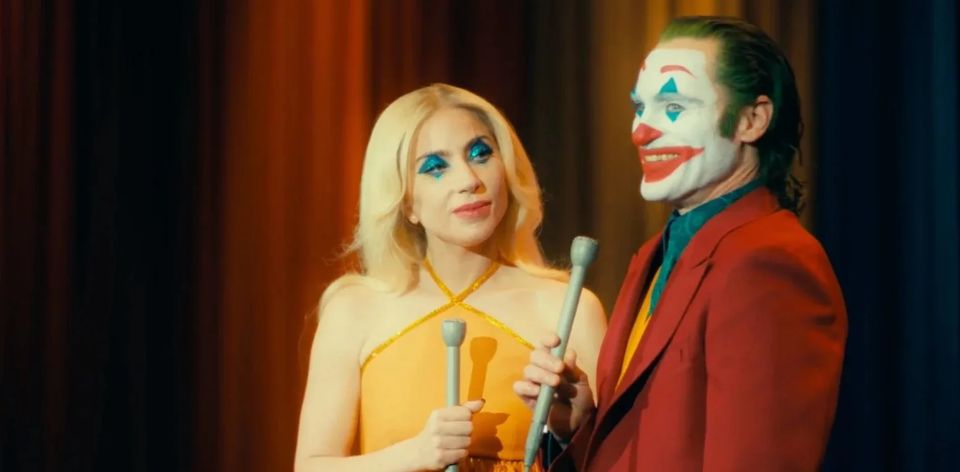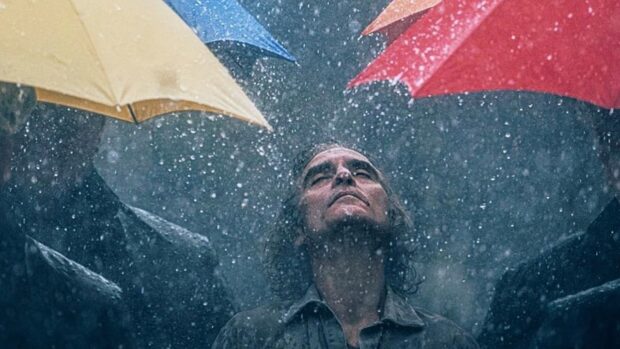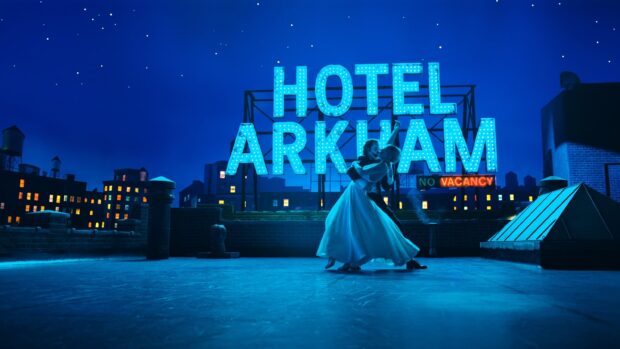Stop me if you’ve heard this one. A clown and his obsessive love walk into a toxic pit. Manipulation. Cruelty. Exploitation. Fans eat it up, blind to the abuse. They call it love. Good joke. Everybody laugh. Roll snare. Curtains.
Todd Phillips’ award-winning Joker walked a dangerous line. While technically impressive and anchored by Joaquin Phoenix’s powerful performance as Arthur Fleck, the film’s portrayal of women as mere objects or barriers, coupled with its muddled political stance and exploration of mental health, left it morally ambiguous and unsettling in today’s post-#MeToo landscape.
Now, in the sequel, we get a brief glimmer of hope that the film will address those consequences. Imprisoned after his public execution of a celebrity on live TV, Fleck is a hollow version of himself, sedated by a mix of drugs and the cruelty of an abusive guard (Brendan Gleeson).
When he meets Lee (Lady Gaga) in a group singing therapy class, they instantly connect. Lee “gets” him, and in a typical male fantasy, she doesn’t believe he needs to change. Thus begins a romance, blending magic musical realism and impotent sexual encounters.
As with the first film, we quickly learn not to trust what we see. Fleck/Joker frequently slips into elaborate song-filled fantasy mid-sentence, though Phillips and co-writer Scott Silver never fully commit to this device. Lee is portrayed as both fanatical and duplicitous, reinforcing the misogyny from the first film. I’m starting to wonder if that misogyny is in front of the camera or behind it.
The film’s highlight is Fleck’s highly publicised murder trial—a classic stage for dramatic revelations. Here we get to the core of the film, albeit through a disjointed mix of commentary on media, personality cults, the prison system, and maybe even reality TV. Phoenix excels in these moments, especially during his ‘small town lawyer’ routine in full makeup, sharing a heartbreaking exchange with Gary (Leigh Gill). But it’s also where the cracks show, revealing that the musical element is more afterthought than centrepiece.
It’s all incredibly frustrating, as there are moments of brilliance in there. With its nods to Warner animation, classical musicals and strong central cast, it looks like a winning formula on paper. Phoenix, for his part, still works wonders with the material, though there’s a sense that both he and the character are weary of Joker. Gaga, meanwhile, is stuck in a limiting role, but her costumes will no doubt be the ships that launch a thousand cosplays.
Taken at face value, for very little lurks beneath the surface of this set of first-draft ideas, JOKER: FOLIE À DEUX is either a skewering of toxic fandom at best, or a middle finger to the fans themselves at worst. The latter tracks with Phillips’s clear disdain for the source material, even if the little Easter eggs and references continue to try chew their cake and spit them out too.
As with the original Joker, the final laugh comes in an explosive finale that subverts expectations as much as it embraces them. In the film, Fleck defies his followers and pays the price and is literally chased down by his own creations. In reality, we see this dynamic in fandom and politics. What’s unclear is whether the monster was right all along or if it’s all just a cosmic joke. That’s all, folks.
2024 | USA | DIRECTOR: Todd Phillips | WRITERS: Scott Silver, Todd Phillips | CAST: Joaquin Phoenix, Lady Gaga, Brendan Gleeson, Catherine Keener | DISTRIBUTOR: Warner Bros. (US), Universal Pictures (Australia) | RUNNING TIME: 138 minutes | RELEASE DATE: 3 October 2024 (Australia), 4 October 2024 (USA)







